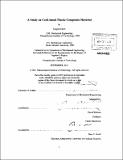A study on cork-based plastic composite material
Author(s)
Kim, Sungmin, Mech. E. Massachusetts Institute of Technology
DownloadFull printable version (18.51Mb)
Other Contributors
Massachusetts Institute of Technology. Dept. of Mechanical Engineering.
Advisor
David Wallace.
Terms of use
Metadata
Show full item recordAbstract
Sandwich panels are mainly used in construction for lightweight structures since their concept is appropriate due to extremely high in-plane and flexural stiffness to weight ratios. However, low structural freedom and high environmental burdens of core material in sandwich panels such as fiberglass, and chemically synthesized foams have retarded a wide use in various areas. Recently it has been suggested that the better performance and economic, environmental benefits could be possibly achieved by using hybrid sandwich panels comprising non-traditional pairs of materials for sandwich panels. Therefore, in this paper, a cork-based plastic composite material has been proposed as a new core material and the possibility for substituting existing core materials have been explored by investigation on its mechanical properties, economic benefit, and environmental impact. Several mechanical testing were carried out on the cork composite and Glass Fiber Reinforced Plastic (GFRP) to determine the mechanical properties and compare their relative performances. By conducting property-limited design cases with the obtained mechanical properties, how they will perform in light, stiff panel application was investigated. Economic analysis was demonstrated with a table top application by using rigidity equality condition. Finally, Eco-impact of the cork composite was investigated by conducting Life Cycle Assessment. The result proved that the cork composite is competitive with other core materials.
Description
Thesis (Mech. E.)--Massachusetts Institute of Technology, Dept. of Mechanical Engineering, 2011. Cataloged from PDF version of thesis. Includes bibliographical references (p. 115-116).
Date issued
2011Department
Massachusetts Institute of Technology. Department of Mechanical EngineeringPublisher
Massachusetts Institute of Technology
Keywords
Mechanical Engineering.